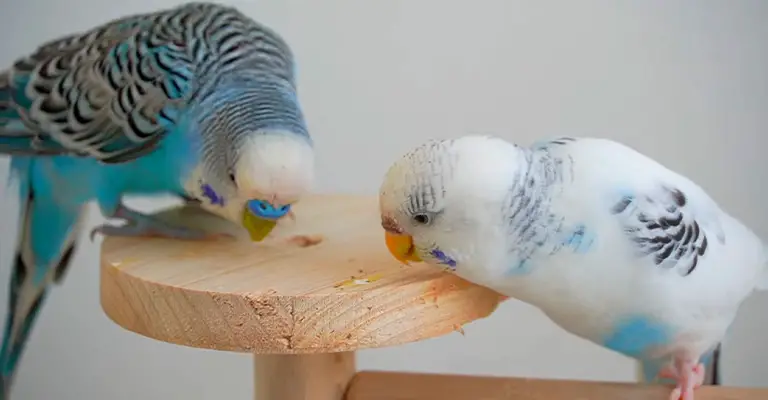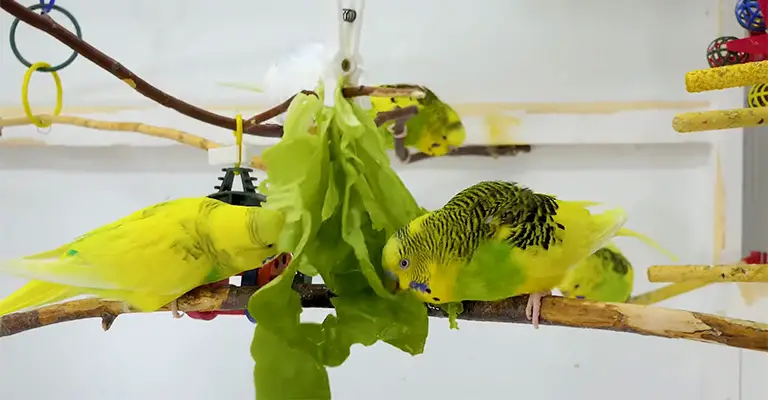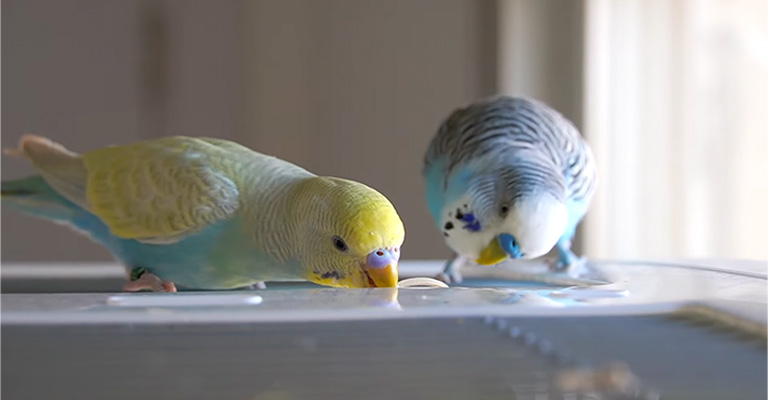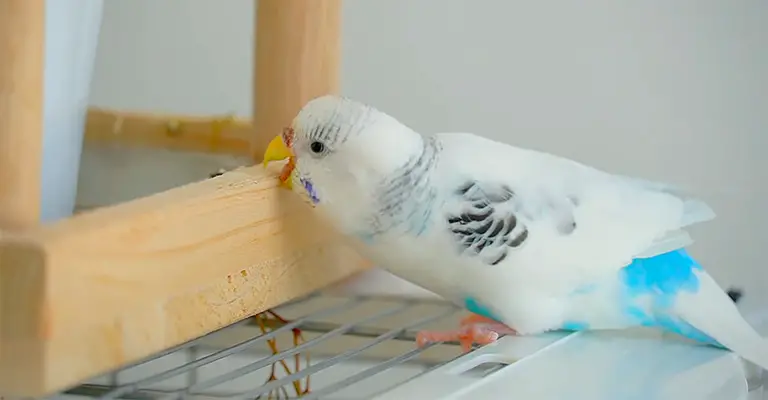Budgies, those charming and colorful avian companions, have captured the hearts of pet owners around the world. Their playful antics and melodic chirps make them delightful additions to any household.
Yet, amidst the joy they bring, some budgie owners have been left puzzled by a curious behavior: dust consumption. Why would a creature known for its exquisite grooming habits choose to ingest dust? If you’re wondering why is my budgie eating dust, we’re here to provide the answer.
In this exploration, we delve into the intriguing world of budgie behavior, uncovering the reasons behind this seemingly odd habit.
From natural instincts to nutritional considerations, we will navigate through possible explanations that shed light on why your feathered friend might be indulging in dust.

Why Is My Budgie Eating Dust?
Have you ever glanced over at your cheerful budgie only to find it nibbling on the dust around its cage? Let’s embark on a journey of discovery to understand the reasons why your budgie might be drawn to consuming dust.
Dust Bathing for Feather Maintenance
One of the primary motivations behind a budgie’s consumption of dust is closely linked to its grooming rituals. Budgies, like many other birds, engage in dust bathing to keep their feathers in optimal condition.
The fine particles of dust help to absorb excess oils and dirt present in the feathers. As the budgie rolls around in the dust, these particles adhere to its plumage, effectively acting as a natural cleaning agent.
By consuming the dust-laden particles, the budgie further aids in the removal of impurities, contributing to the maintenance of clean and healthy feathers.
Regulation of Body Temperature
Beyond the cosmetic benefits, dust bathing also plays a vital role in helping budgies regulate their body temperature.
The process of rolling around in the dust serves to dislodge parasites and debris from their feathers, which could potentially impede their ability to maintain the right body temperature.
By indulging in this behavior, budgies ensure that their feathers are well-spaced and free from any encumbrances.
This allows air to circulate effectively between the feathers, helping them to either trap warmth close to their bodies or release excess heat, depending on the environmental conditions.
Nutritional Considerations

Intriguingly, there’s more to a budgie’s fascination with dust than just grooming and temperature regulation. Dust consumption might also serve a nutritional purpose.
Certain types of dust, such as mineral-rich soil or clay, can provide budgies with essential minerals that are beneficial for their health.
Elements like calcium and other trace minerals are present in these substrates and can be ingested when budgies peck at or consume the dust.
This supplementary intake of minerals can support their overall health, contribute to strong bones, and aid in other bodily functions.
Instinctual Behaviors
Understanding the behavior of budgies also involves acknowledging their instinctual tendencies inherited from their wild counterparts.
In their natural habitats, budgies encounter dusty environments where dust bathing is not just a grooming activity but also a means of blending in with their surroundings.
By rolling in dust, they acquire a layer of dust particles on their feathers that provides camouflage and protection from predators.
This instinctual behavior, even when they’re kept as pets in captivity, remains an intrinsic part of their behavioral repertoire.
Providing Enrichment and Care
As budgie owners, it’s essential to cater to their innate behaviors by providing suitable opportunities for dust bathing.
Including a shallow container filled with appropriate dusting materials like fine sand, dust, or mineral-rich substrate in their cage or aviary can encourage and facilitate this behavior.
Ensuring a well-maintained and clean environment allows budgies to engage in their instincts safely. By understanding and accommodating their needs, we enhance their quality of life and build a deeper connection with our avian companions.
Stress and Comfort
Budgies, like many animals, can engage in certain behaviors as a way to cope with stress or discomfort. Dust consumption, in some cases, might serve as a form of self-soothing for budgies that are feeling anxious or uneasy.
The act of dust bathing can be a repetitive and calming activity that helps them alleviate stress and regain a sense of comfort.
This behavior could be particularly noticeable during times of change, such as when they are introduced to a new environment or experience disruptions in their routine.
Social Learning and Imitation
Budgies are social animals that often learn from observing and imitating the behaviors of their flock mates.
If one budgie in a group engages in dust bathing and consumes dust, other budgies might imitate the behavior even if they don’t fully understand the underlying reasons.
This social learning can lead to a domino effect, where multiple budgies adopt the habit without necessarily having the same motivations.
This imitation might also extend to captive budgies observing their owners performing tasks within their living space.
Is It Safe for Budgies to Eat Dust?

Yes, it is generally safe for budgies to engage in dust bathing and consume small amounts of dust. In fact, dust bathing is a natural behavior for many bird species, including budgies, and it serves several important purposes for their well-being.
Feather Maintenance
Dust bathing aids in keeping the budgie’s feathers clean and healthy. The dust particles help to absorb excess oils and dirt from their plumage.
Rolling around in the dust helps to dislodge these impurities, ensuring that their feathers remain in good condition.
Temperature Regulation
Dust bathing also helps budgies regulate their body temperature. By removing debris and parasites from their feathers, they allow air to circulate efficiently between the feathers. This helps them maintain their body temperature, which is crucial for their overall health.
Mineral Intake
In some cases, budgies may consume dust or soil that is rich in minerals. This can provide them with essential nutrients like calcium and other trace minerals that contribute to their overall health, including bone strength. However, there are a few important considerations to keep in mind:
Dusting Material
Ensure that the dust or substrate provided for dust bathing is safe and free from contaminants. Avoid using dusty materials that might contain harmful chemicals or toxins.
Moderation
While it’s natural for budgies to consume small amounts of dust, excessive ingestion could potentially lead to health issues. Make sure the dust bathing area is used in moderation and that your budgie has access to clean water for hydration.
Variety
While budgies may consume dust, it’s not a substitute for their regular diet. Providing a balanced and nutritionally rich diet is essential for their overall health and well-being.
Observation
Keep an eye on your budgie’s behavior. If you notice any changes in their health, appetite, or behavior, it’s best to consult a veterinarian who specializes in avian care.
How to Stop My Budgie from Eating Dust?

If you’re concerned about your budgie’s excessive dust consumption and would like to help them minimize this behavior, here are a few steps you can consider:
Provide a Balanced Diet
Ensure that your budgie’s diet is well-balanced and meets their nutritional needs. A proper diet can help address any potential nutritional deficiencies that might lead to excessive dust consumption.
Monitor Dust Quality
If you suspect that the dust or substrate your budgie is consuming is potentially harmful, consider changing to a different type of dust or substrate. Opt for safe and clean materials that are specifically designed for bird dust bathing.
Offer a Variety of Enrichment
Providing a variety of toys, perches, and activities can help divert your budgie’s attention away from excessive dust consumption. Mental and physical enrichment can reduce the likelihood of boredom-related behaviors.
Increase Social Interaction
Budgies are social animals, and spending quality time interacting with you or other budgies can reduce stress and anxiety that might contribute to excessive dust consumption.
Consult a Veterinarian
If your budgie’s dust consumption seems to be causing health issues or is a result of an underlying problem, consult a veterinarian who specializes in avian care. They can assess your budgie’s overall health and behavior to provide tailored advice.
Environmental Changes
Observe if there are any changes in the bird’s environment that might be triggering the behavior. Changes in routine, cage placement or the introduction of new items might lead to stress-related behaviors.
Limit Dust Bathing Time
If your budgie seems to be excessively dust bathing, you can limit the amount of time they have access to the dusting area. This can help reduce the amount of dust they ingest.
FAQs
Budgies eat dust as part of their natural behaviors. Dust bathing helps them maintain clean feathers, regulate body temperature, and potentially acquire essential minerals. It’s a normal and instinctual behavior that supports their overall well-being.
Yes, it’s generally safe for budgies to engage in dust bathing and consume small amounts of dust.
However, make sure to provide clean and safe dusting materials. Excessive consumption should be monitored and addressed, as it might indicate an underlying issue.
Budgies should have regular access to a dusting area, but the frequency depends on their individual preferences.
Some might dust bathe daily, while others may do so less frequently. Observe your budgie’s behavior and adjust their access to dust accordingly.
It’s important to choose safe and appropriate dusting materials. Avoid materials with harmful chemicals or toxins.
Commercially available bird-safe dust or fine sand designed for dust bathing is recommended. Consult with avian experts if you’re unsure about the right materials.
Excessive dust consumption could be a sign of boredom, stress, or an underlying health issue.
Monitor their behavior and consult a veterinarian if you’re concerned. Addressing potential causes of stress, providing enrichment, and ensuring a balanced diet can help alleviate this behavior.
Conclusion
The act of a budgie consuming dust, though unusual at first glance, is actually rooted in the bird’s innate behaviors and physiological needs.
Through our investigation, we’ve learned that dust bathing serves multiple vital purposes for these avian companions.
Understanding this behavior enables us to provide enriched environments for our budgies, including access to suitable substrates for dust bathing.
As responsible pet owners, we should recognize the natural instincts that drive these actions and ensure that our budgies’ habitats accommodate their unique needs.
By unraveling the mystery behind why budgies eat dust, we not only deepen our connection with these captivating creatures but also enhance their quality of life.
As we continue to observe and study the intricate behaviors of our feathered companions, we gain a greater appreciation for the fascinating world they inhabit within our homes.